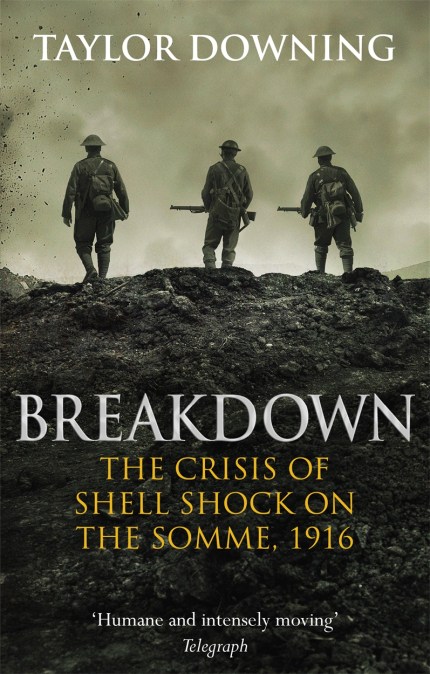Paralysis. Stuttering. The ‘shakes’. Inability to stand or walk. Temporary blindness or deafness.
When strange symptoms like these began appearing in men at Casualty Clearing Stations in 1915, a debate began in army and medical circles as to what it was, what had caused it and what could be done to cure it. But the numbers were never large.
Then in July 1916 with the start of the Somme battle the incidence of shell shock rocketed. The high command of the British army began to panic. An increasingly large number of men seemed to have simply lost the will to fight. As entire battalions had to be withdrawn from the front, commanders and military doctors desperately tried to come up with explanations as to what was going wrong. ‘Shell shock’ – what we would now refer to as battle trauma – was sweeping the Western Front.
By the beginning of August 1916, nearly 200,000 British soldiers had been killed or wounded during the first month of fighting along the Somme. Another 300,000 would be lost before the battle was over. But the army always said it could not calculate the exact number of those suffering from shell shock. Re-assessing the official casualty figures, Taylor Downing for the first time comes up with an accurate estimate of the total numbers who were taken out of action by psychological wounds. It is a shocking figure.
Taylor Downing’s revelatory new book follows units and individuals from signing up to the Pals Battalions of 1914, through to the horrors of their experiences on the Somme which led to the shell shock that, unrelated to weakness or cowardice, left the men unable to continue fighting. He shines a light on the official – and brutal – response to the epidemic, even against those officers and doctors who looked on it sympathetically. It was, they believed, a form of hysteria. It was contagious. And it had to be stopped.
Breakdown brings an entirely new perspective to bear on one of the iconic battles of the First World War.
When strange symptoms like these began appearing in men at Casualty Clearing Stations in 1915, a debate began in army and medical circles as to what it was, what had caused it and what could be done to cure it. But the numbers were never large.
Then in July 1916 with the start of the Somme battle the incidence of shell shock rocketed. The high command of the British army began to panic. An increasingly large number of men seemed to have simply lost the will to fight. As entire battalions had to be withdrawn from the front, commanders and military doctors desperately tried to come up with explanations as to what was going wrong. ‘Shell shock’ – what we would now refer to as battle trauma – was sweeping the Western Front.
By the beginning of August 1916, nearly 200,000 British soldiers had been killed or wounded during the first month of fighting along the Somme. Another 300,000 would be lost before the battle was over. But the army always said it could not calculate the exact number of those suffering from shell shock. Re-assessing the official casualty figures, Taylor Downing for the first time comes up with an accurate estimate of the total numbers who were taken out of action by psychological wounds. It is a shocking figure.
Taylor Downing’s revelatory new book follows units and individuals from signing up to the Pals Battalions of 1914, through to the horrors of their experiences on the Somme which led to the shell shock that, unrelated to weakness or cowardice, left the men unable to continue fighting. He shines a light on the official – and brutal – response to the epidemic, even against those officers and doctors who looked on it sympathetically. It was, they believed, a form of hysteria. It was contagious. And it had to be stopped.
Breakdown brings an entirely new perspective to bear on one of the iconic battles of the First World War.
Newsletter Signup
By clicking ‘Sign Up,’ I acknowledge that I have read and agree to Hachette Book Group’s Privacy Policy and Terms of Use
Reviews
This is a thoughtful, intelligent book . . . Thoroughly researched, highly readable and highly recommended
This vivid, compassionate account draws on harrowing first-person testimony to chronicle the sometimes humane, but more often cruel and uncaring, treatment of damaged men, both in wartime and its aftermath
The tragic fate of the Lonsdales forms one of the most telling subplots in Breakdown, the historian Taylor Downing's superb account of the military's response to the epidemic of shell shock . . . Downing manages to offer a useful perspective by unpacking the pivotal role the cataclysm in the Somme played in the birth not just of military psychiatry, but a new era in our understanding of mental health . . . Downing's book is a necessary remind that trauma is an injury, and not a sign of weakness
What is innovative about Downing's approach is the interleaving of "the crisis of shell shock" with the military history of the Somme. He tells both histories concisely and with good balance . . . Downing is too clever a historian to rehearse cliches about things never being the same again'
An impressive, balanced and often deeply moving book. As the Somme's anniversary approaches, anyone who wishes to understand it and its terrible consequences should buy Breakdown
[A] humane and intensely moving book
